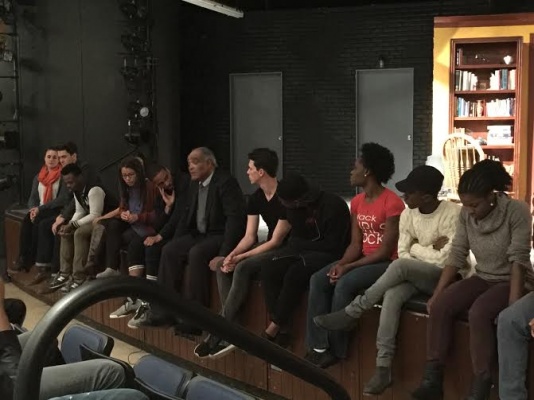Fordham Theatre Presents “Force Continuum:” Exploring Police Brutality and Other Police Relations
The cast and crew of Fordham University Lincoln Center’s fall play about police brutality, Force Continuum, look on as they share their experiences with the mature and relevant content in the play during their TalkBack session on October 15th, 2015. (PHOTO BY LYDIA BENNER/ THE OBSERVER)
October 27, 2015
On Oct. 8, Fordham College at Lincoln Center (FCLC) kicked off the 2015-2016 Mainstage Season: A Season at the Mountaintop with “Force Continuum.” The Oct. 15 performance was immediately followed by a talkback with the Fordham cast, as well as Playwright Kia Corthron, Director Elena Araoz and original cast member David Fonteno.
The Q&A with the cast and crew was lead by Katheryn Crawford, Associate Director of The Dorothy Day Center for Service and Justice. The discussion predominantly focused on the motivation behind the play, as well as how the themes embedded in “Force Continuum” are increasingly relevant in today’s global world.
“This play premiered in 2001 but it’s relevance is still strong today,” Wenzel said. “[It] uses the art of storytelling to convey the experiences of police violence and the physical, emotional and psychological impacts of racism.”
“Force Continuum” is driven by the theme of police relations and brutality, specifically how it applies to Dece, an African-American officer whose ambition to become a cop stems from familial ties to NYPD law enforcement.
“This play focuses on the perspective of a cop. As a society, we always see it from a victim’s perspective,” Kelveen Fabian, FCLC ‘17, who plays the role of Dece, said. “[This play] asks, why are police officers killing black people and what is our society doing to prevent that?”
Dece’s role becomes incredibly different than he anticipated, particularly when he and his white partner, Flip, question people of color. Flip’s reluctance causes Dece to question his own identity in relation to the police force: Is he genuinely part of the police team, or is his position a betrayal to his race?
Dece’s late father had a similar experience: “He’d been trying to be a detective, a buddy, a part of society, a part of the department,” Kevin Jones Jr., FCLC ’19, who plays the role of the father, said “but he keeps getting [put down] by his peers, just because of the color of his skin.”
[quote_left]“It makes you wonder about these cops as well. Do we believe that cops don’t go through that? I feel like those people really sit down in a dark room and they think about how much people hate them.”[/quote_left]
“I wanted to address police misconduct,” Corthron replied when asked about the intention of her script. “I mean, it’s funny because that was my original idea, but ultimately I don’t describe it that way. I describe it as the relationship between the NYPD and the black community.”
“Force Continuum” also highlights the stigma of stress and suicide among the force. It is revealed that Dece’s father had committed suicide following a particularly gruesome act of police brutality, while Dece’s partner commits suicide following the accidental death of someone he was trying to detain.
“I’d just kind of run the [play] through my mind and I’d break down,” Fabian said. “It makes you wonder about these cops as well. Do we believe that cops don’t go through that? I feel like those people really sit down in a dark room and they think about how much people hate them.”
While the play was written over a decade ago, issues of racism and social injustice remain a pressing matter: according to Crawford, “since the beginning of 2015, 903 people, armed and unarmed throughout the United States, have been killed by police.”
“Sadly, I can write it today for the same reasons that I wrote it then,” Corthron said. “I mean it’s interesting, because I do feel like there’s a little change today with much credit to the Black Lives Matter movement.”
Corthron reminded the audience of two particular cases that provided inspiration for the script: the death of Amadou Diallo, who was shot a record 41 times, as well as the sexual assault on Abner Louima. She also referenced the infamous beating of Rodney King, whose case was a catalyst for the 1992 Los Angeles Riots.
Although “Force Continuum” was written in 2001, Corthron claimed that “the only difference now is that we have iPhones.” Original cast member David Fonteno, who played the Grandfather, agreed that the widespread use of iPhones and recording devices have helped raise awareness of police brutality. “One way to look at it [is to ask] what’s different,” he said. “[We] talked about Rodney King and how he got recorded. That’s a major difference between now and not just 50 years ago, but 15 years ago.”
“Force Continuum” is just the tip of the iceberg for Fordham Theatre. “A Season at the Mountaintop,” named in homage to Martin Luther King Jr.’s final speech, seeks to produce plays that focus on racial violence and how we can begin to transcend it.










